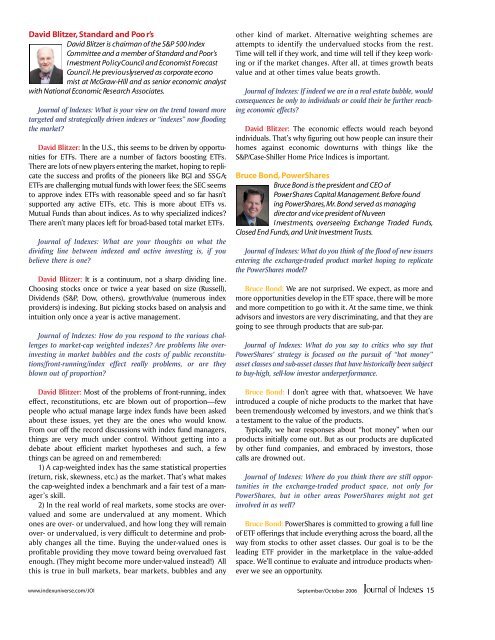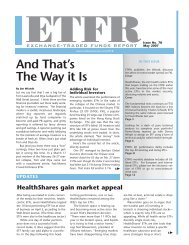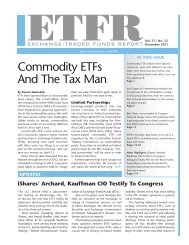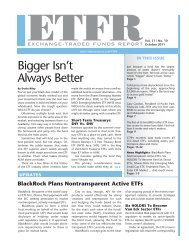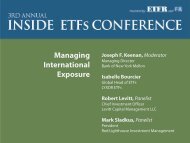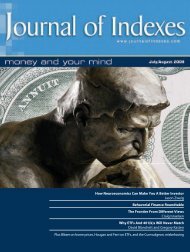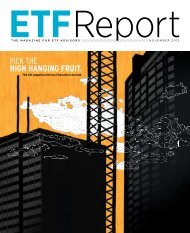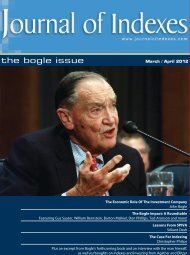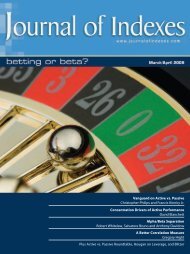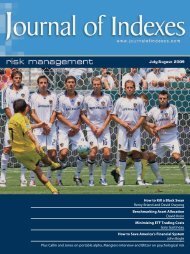Journal of Indexes, 2006 - IndexUniverse.com
Journal of Indexes, 2006 - IndexUniverse.com
Journal of Indexes, 2006 - IndexUniverse.com
You also want an ePaper? Increase the reach of your titles
YUMPU automatically turns print PDFs into web optimized ePapers that Google loves.
David Blitze r, St a n d a rd and Poo r’s<br />
David Bl i t zer is chairman <strong>of</strong> the S&P 500 Index<br />
Co m m i t tee and a member <strong>of</strong> Standard and Poo r’s<br />
I nvestment Po l i cy Council and Economist Fo re cast<br />
Co u n c i l . He prev i o u s ly served as co r po ra te eco n o<br />
mist at McGraw-Hill and as senior economic analy s t<br />
with National Economic Re s e a rch As s oc i a te s.<br />
<strong>Journal</strong> <strong>of</strong> <strong>Indexes</strong>: What is your view on the trend toward more<br />
targeted and strategically driven indexes or “indexes” now flooding<br />
the marke t ?<br />
David Blitzer: In the U.S., this seems to be driven by opportunities<br />
for ETFs. There are a number <strong>of</strong> factors boosting ETFs.<br />
T h e re are lots <strong>of</strong> new players entering the market, hoping to re p l i-<br />
cate the success and pr<strong>of</strong>its <strong>of</strong> the pioneers like BGI and SS G A;<br />
ETFs are challenging mutual funds with lower fees; the SEC seems<br />
to approve index ETFs with reasonable speed and so far hasn’ t<br />
supported any active ETFs, etc. This is more about ETFs vs.<br />
Mutual Funds than about indices. As to why specialized indices?<br />
T h e re are n’t many places left for broad-based total market ETFs.<br />
<strong>Journal</strong> <strong>of</strong> <strong>Indexes</strong>: What are your thoughts on what the<br />
dividing line between indexed and active investing is, if you<br />
believe there is one?<br />
David Blitzer: It is a continuum, not a sharp dividing line.<br />
Choosing stocks once or twice a year based on size (Ru s s e l l ) ,<br />
Dividends (S&P, Dow, others), growth/value (numerous index<br />
p roviders) is indexing. But picking stocks based on analysis and<br />
intuition only once a year is active management.<br />
<strong>Journal</strong> <strong>of</strong> <strong>Indexes</strong>: How do you respond to the various challenges<br />
to market-cap weighted indexes? Are problems like overinvesting<br />
in market bubbles and the costs <strong>of</strong> public reconstitut<br />
i o n s / f ront-running/index effect really problems, or are they<br />
blown out <strong>of</strong> proportion?<br />
David Blitzer: Most <strong>of</strong> the problems <strong>of</strong> front-running, index<br />
effect, reconstitutions, etc are blown out <strong>of</strong> pro p o r t i o n — f e w<br />
people who actual manage large index funds have been aske d<br />
about these issues, yet they are the ones who would know.<br />
From our <strong>of</strong>f the re c o rd discussions with index fund managers,<br />
things are very much under control. Without getting into a<br />
debate about efficient market hypotheses and such, a few<br />
things can be agreed on and re m e m b e red:<br />
1) A cap-weighted index has the same statistical properties<br />
(return, risk, skewness, etc.) as the market. That’s what makes<br />
the cap-weighted index a benchmark and a fair test <strong>of</strong> a manager’s<br />
skill.<br />
2) In the real world <strong>of</strong> real markets, some stocks are overvalued<br />
and some are undervalued at any moment. Which<br />
ones are over- or undervalued, and how long they will remain<br />
over- or undervalued, is very difficult to determine and probably<br />
changes all the time. Buying the under-valued ones is<br />
pr<strong>of</strong>itable providing they move toward being overvalued fast<br />
enough. (They might be<strong>com</strong>e more under-valued instead!) All<br />
this is true in bull markets, bear markets, bubbles and any<br />
other kind <strong>of</strong> market. Alternative weighting schemes are<br />
attempts to identify the undervalued stocks from the rest.<br />
Time will tell if they work, and time will tell if they keep working<br />
or if the market changes. After all, at times growth beats<br />
value and at other times value beats growth.<br />
<strong>Journal</strong> <strong>of</strong> <strong>Indexes</strong>: If indeed we are in a real estate bubble, would<br />
consequences be only to individuals or could their be further re a c h-<br />
ing economic effects?<br />
David Blitzer: The economic effects would reach beyond<br />
individuals. That’s why figuring out how people can insure their<br />
homes against economic downturns with things like the<br />
S&P/Case-Shiller Home Price Indices is important.<br />
B ru ce Bo n d, Powe r Sh a re s<br />
Bru ce Bond is the president and CEO <strong>of</strong><br />
Powe r Sh a res Capital Management. Be fo re fo u n d<br />
ing Powe r Sh a re s, M r. Bond served as managing<br />
d i re ctor and vice president <strong>of</strong> Nu veen<br />
I nve s t m e n t s, overseeing Exchange Traded Fu n d s,<br />
Closed End Fu n d s, and Unit Investment Tru s t s.<br />
<strong>Journal</strong> <strong>of</strong> <strong>Indexes</strong>: What do you think <strong>of</strong> the flood <strong>of</strong> new issuers<br />
entering the exchange-traded product market hoping to re p l i c a t e<br />
the PowerShares model?<br />
Bruce Bond: We are not surprised. We expect, as more and<br />
m o re opportunities develop in the ETF space, there will be more<br />
and more <strong>com</strong>petition to go with it. At the same time, we think<br />
advisors and investors are very discriminating, and that they are<br />
going to see through products that are sub-par.<br />
<strong>Journal</strong> <strong>of</strong> <strong>Indexes</strong>: What do you say to critics who say that<br />
P o w e r S h a res’ strategy is focused on the pursuit <strong>of</strong> “hot money”<br />
asset classes and sub-asset classes that have historically been subject<br />
to buy-high, sell-low investor underperformance.<br />
Bruce Bond: I don’t agree with that, whatsoever. We have<br />
i n t roduced a couple <strong>of</strong> niche products to the market that have<br />
been tremendously wel<strong>com</strong>ed by investors, and we think that’s<br />
a testament to the value <strong>of</strong> the products.<br />
Ty p i c a l l y, we hear responses about “hot money” when our<br />
p roducts initially <strong>com</strong>e out. But as our products are duplicated<br />
by other fund <strong>com</strong>panies, and embraced by investors, those<br />
calls are drowned out.<br />
<strong>Journal</strong> <strong>of</strong> <strong>Indexes</strong>: Where do you think there are still opportunities<br />
in the exchange-traded product space, not only for<br />
PowerShares, but in other areas PowerShares might not get<br />
involved in as well?<br />
Bruce Bond: Po w e r S h a res is <strong>com</strong>mitted to growing a full line<br />
<strong>of</strong> ETF <strong>of</strong>ferings that include everything across the board, all the<br />
way from stocks to other asset classes. Our goal is to be the<br />
leading ETF provider in the marketplace in the value-added<br />
space. We’ll continue to evaluate and introduce products whenever<br />
we see an opportunity.<br />
www.indexuniverse.<strong>com</strong>/JOI<br />
September/October <strong>2006</strong><br />
15


